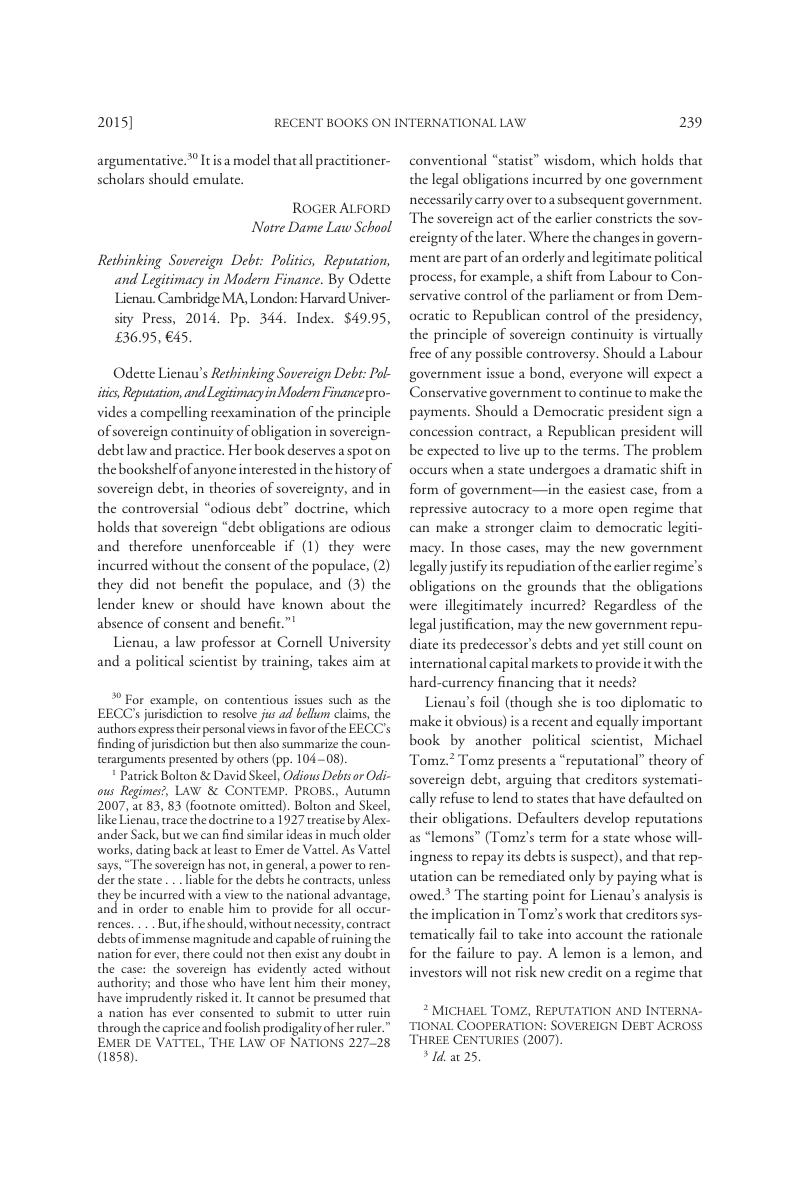No CrossRef data available.
Article contents
Rethinking Sovereign Debt: Politics, Reputation, and Legitimacy in Modern Finance. By Odette Lienau. Cambridge MA, London: Harvard University Press, 2014. Pp. 344. Index. $49.95, £36.95, €45.
Published online by Cambridge University Press: 20 January 2017
Abstract

- Type
- Recent Books on International Law
- Information
- Copyright
- Copyright © American Society of International Law 2015
References
1 Patrick Bolton & David Skeel, Odious Debts or Odious Regimes?, Law & Contemp. Probs., Autumn 2007, at 83, 83 (footnote omitted). Bolton and Skeel, like Lienau, trace the doctrine to a 1927 treatise by Alexander Sack, but we can find similar ideas in much older works, dating back at least to Emer de Vattel. As Vattel says, “The sovereign has not, in general, a power to render the state... liable for the debts he contracts, unless they be incurred with a view to the national advantage, and in order to enable him to provide for all occurrences... But, if he should, without necessity, contract debts of immense magnitude and capable of ruining the nation for ever, there could not then exist any doubt in the case: the sovereign has evidently acted without authority; and those who have lent him their money, have imprudently risked it. It cannot be presumed that a nation has ever consented to submit to utter ruin through the caprice and foolish prodigality other ruler.” Emer De Vattel, The Law of Nations 227–28
2 Michael Tomz, Reputation and International Cooperation: Sovereign Debt Across Three Centuries (2007).
3 Id. at 25.
4 Yackee, Jason Webb, Investment Treaties and Investor Corruption: An Emerging Defense for Host States?, 52 VA. J. Int’l L. 723, 726 (2012)Google Scholar.
5 Jeromin Zettelmeyer, Christoph Trebesch & Mitu Gulati, The Greek Debt Restructuring: An Autopsy (Peterson Inst. Int’l Econ. Working Paper No. 13-8, 2013), available at http://www.piie.com/publications/wp/wp13-8.pdf.
6 Id.
7 Barry Eichengreen, Restructuring Sovereign Debt, J. Econ. Persp., Fall 2003, at 75, 79 (“In this view, the distinctive weaknesses of the sovereign debt market—its low levels of liquidity, high volatility and substantial spreads—reflect not that the restructuring of unsustainable debts is too difficult, but that it is too easy.”).
8 Tinoco Concessions (UK v. Costa Rica), 1 R.I.A.A. 369 (1923), reprinted in 18 AJIL 147 (1924) (Taft, sole arb.).
9 Alison E. Post, Foreign and Domestic Investment in Argentina: The Politics of Privatized Infrastructure 17 (2014).
10 Allee, Todd & Peinhardt, Clint, Contingent Credibility: The Impact of Investment Treaty Violations on Foreign Direct Investment, 65 Int’l Org. 401, 421 (2011)CrossRefGoogle Scholar.




